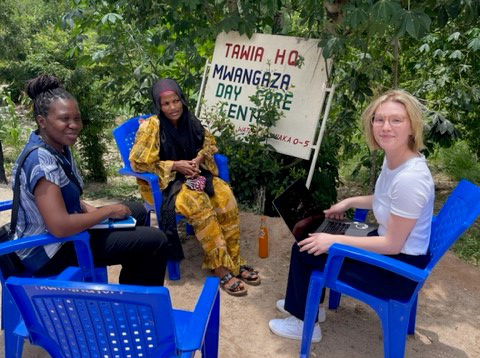International Human Rights Practicum in Tanzania Audrey Curelop '23L discusses a recent research trip to Tanzania as part of the International Human Rights Practicum.
Audrey Curelop ’23L is a third-year law student at W&L School of Law. She grew up in Hillsborough, North Carolina and went to undergrad at the University of North Carolina at Chapel Hill. After graduation, Audrey will clerk for Judge John Tran at the Fairfax Circuit Court.
What is the focus of the International Human Rights Practicum?
We work in collaboration with a women’s legal aid organization in Tanzania, the Women’s Legal Aid Centre (WLAC), to write a research report based on qualitative fact-finding. Each year, the specific focus of the research changes–WLAC chooses the topic based on issues they see through their work. This year our research focused on how intestate succession laws in Tanzania affect women, and widows specifically. Intestate means not having a will to govern inheritance when someone dies.
What kind of work/research did you do to prepare for the trip?
To prepare for the trip, we learned a lot about the legal system in Tanzania to make sure we could hit the ground running when we arrived. We also ran practice interviews and communicated with WLAC to determine their goals for the project.
Describe the work you did while in Tanzania.
Our primary job in Tanzania was on-the-ground fact-finding. In practice, this means we conducted a lot of interviews with parties who have personal experience with or knowledge of the issues we were researching. We interviewed over 50 widows who have previously dealt with or are currently going through the legal system to seek their inheritance/property rights after the death of their husbands. We additionally spoke with government officials, judicial representatives, and non-profit organizations that have experience in inheritance matters.
What was most surprising aspect of the trip?
Professor Bond does an incredible job of preparing the class for the trip, from work requirements to travel logistics to cultural differences. But if I had to choose one surprising aspect, it would be the amount we were able to learn in one week. Although we spent a month and a half preparing for this trip and researching, I felt like I learned more from our interview experiences that I could have ever learned from doing secondary research. The process of engaging in primary research was incredibly fulfilling.
What is next for the class?
Right now we are synthesizing all of the interviews and drafting a report to share with WLAC. This report will include our findings about the challenges women in Tanzania face related to inheritance law and recommendations on how to avoid these abuses in the future. Once the report is finished, WLAC will use it primarily to advocate for legislative action.
How will this experience inform your law school experience?
I don’t think I will ever forget the experience. I came to W&L because of the incredible experiential opportunities that the school provides. I am happy that I had the opportunity to participate and hope that other students in the future get to participate as well.
 Audrey Curelop ’23L conducts research in Tanzania.
Audrey Curelop ’23L conducts research in Tanzania.
You must be logged in to post a comment.